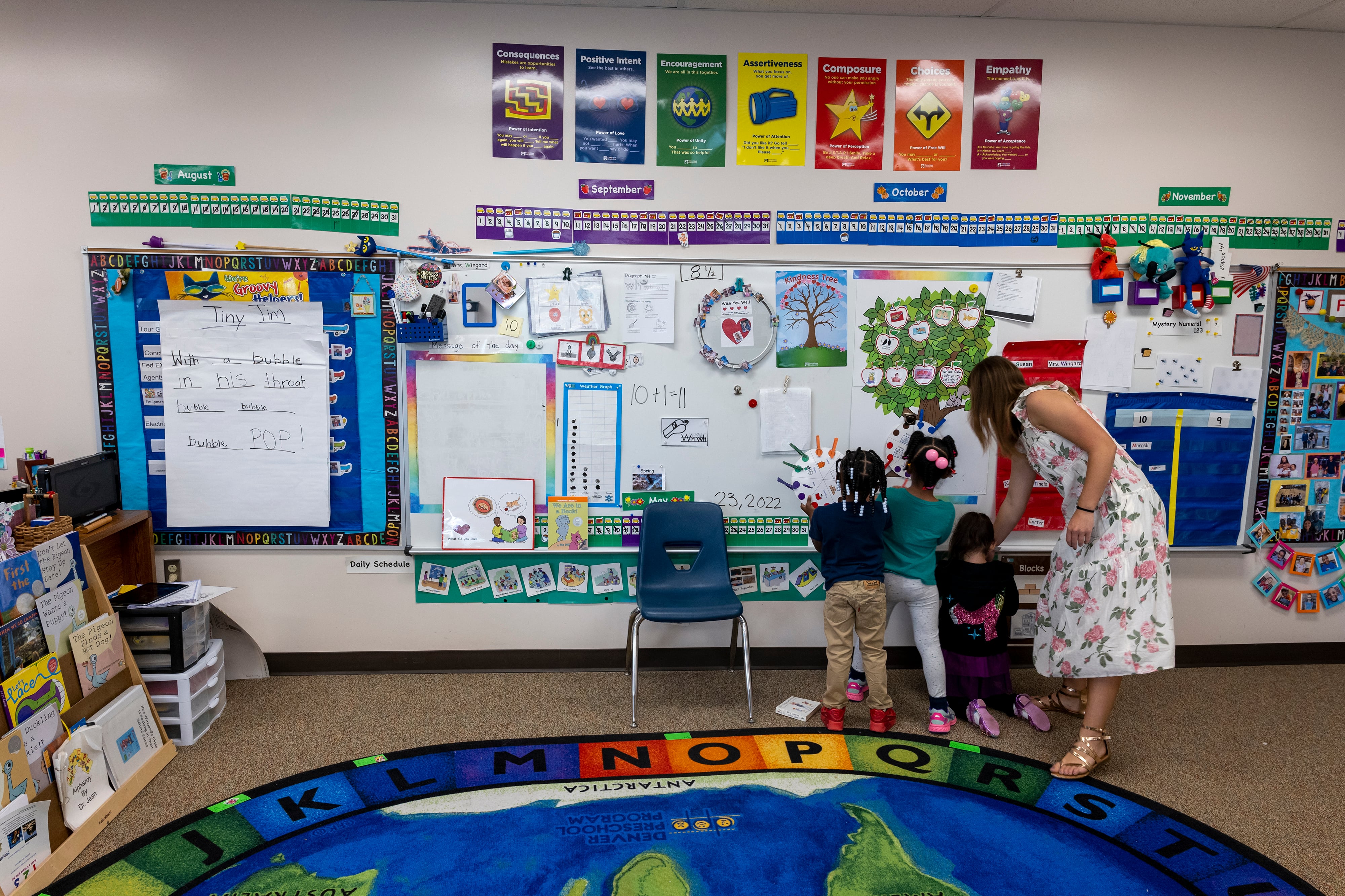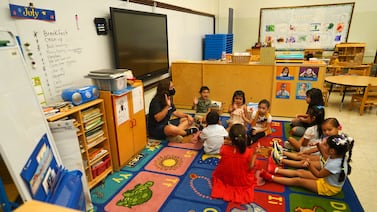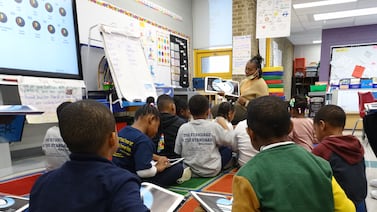Chalkbeat is a nonprofit news organization covering schools in communities across America. Sign up for our free monthly newsletter The Starting Line to keep up with news about early childhood education.
On March 30, about 26,000 Colorado families are scheduled to find out what preschool their children can enroll in next fall as part of the state’s new universal preschool program.
But more than 20 education and early childhood groups have unsuccessfully sought to delay those notifications because they see too many problems. An inadequate computer algorithm and confusion about the process mean some families might lose out on top choices and others might be offered seats that don’t meet their needs. It’s also not clear Colorado will have enough money to offer all the hours many families believe are guaranteed.
The groups spelled out their concerns in two letters sent last week to the Colorado Department of Early Childhood, the new state agency in charge of the universal preschool program. Echoing critiques that have bubbled up consistently over several months, they said the rushed rollout has left too many unanswered questions and could tarnish public perception of the program during its first year.
“It’s our first time. Let’s do this right,” said Diane Smith, executive director of the Douglas County Early Childhood Council, which was one of 16 groups to sign one of the letters.
The other letter, which raised similar issues, came from five groups, including the Colorado Association of School Executives, the Colorado Association of School Boards and the Colorado Rural Schools Alliance. Chalkbeat obtained copies of the letters through a public records request.
Lisa Roy, executive director of the Department of Early Childhood, said state officials are working with the groups that signed the letters to address their concerns, but aren’t planning to change the March 30 notification date because it would push other key deadlines back.
She said about 86% of approximately 26,000 4-year-olds who applied for universal preschool by late February have been matched with their first-choice preschool. The rest — around 3,600 children — either didn’t match with any preschool or got matched with a lower-ranked choice.
“There’s high expectations I know for a new state government department to know everything, but … we’re a startup department and this is a startup initiative,” Roy said.
Some families face more challenges with preschool applications
Both preschool providers and representatives from groups that signed the letters agree that many Colorado families applying for the universal preschool program will get matched with their top choices. But they worry about families who face more barriers in navigating the brand-new process.
Once Colorado families are notified and begin accepting their matches on March 30, seats will fill up rapidly — leaving fewer options for families who had problems applying.
Elsa Holguin, president and CEO of the Denver Preschool Program, a group that signed one of the letters, said her staff has tried to reach families who skipped checkboxes or made other errors on the universal preschool application. But some parents didn’t list email addresses and their voicemail boxes are full, so staff must call repeatedly. She said more time before the match notification would help ensure such families are contacted and matched with a preschool.
One of the two recent letters noted that state preschool officials have called this year a “learning year” and asked for patience and grace from preschool providers.
But families “don’t have the same ability to count next year as a learning year when they are depending on us to serve their students and ensure a positive educational experience,” the letter said. “We are very concerned about the frustration and questions we’re already hearing from them.”
Kari Thibodeau, director of Parker Landing Child Development Center in Douglas County, has been on the receiving end of such questions after she contacted 11 families whose children she expected would be matched with her next year, but weren’t on the list she received.
Some of the parents became so worried about losing the chance to stay at the center their kids have attended since infancy, they’ve offered to send Thibodeau screenshots of their universal preschool application to prove they chose Parker Landing.
Thibodeau sympathizes, but tells them she doesn’t control how the state’s matching system works.
“I just want to make sure I’m not going to frustrate my families because they get paired with another school,” she said. “They’re all nervous.”
Families can still apply for a universal preschool seat now, but they may have fewer choices and will find out their matches later.
Problems with computer algorithm and funding uncertainty
Another issue raised by the letter writers is that the computer matching system erroneously pushed some families to the front of the line for all five of their preschool choices. While families are supposed to get that boost for a preschool their child already attends, a program a sibling attends, or one where a parent works, the algorithm applied those priority points to every preschool choice on a family’s application.
“To allow families to have preferred placement in the lottery system for five providers when their preferred status should only apply to one site unfairly prioritizes those students over all other applicants in the system,” the letter from the five education groups stated.
Roy said the computer algorithm gives families priority points for all their preschool choices because the state didn’t pay to make it more specific. That may be fixed next year.
“It costs a lot of money,” she said. “We plan on shifting that but have to have the funding to do so.”
There are also questions about whether the state will have enough funding to provide 30 hours of preschool a week to certain 4-year-olds as universal preschool messaging indicated. Eligible children include those who come from lower-income families, are English learners, are homeless, or are in foster care.
Roy said because of higher-than-expected interest in universal preschool the state is analyzing the cost now and won’t have an answer about which preschoolers will get the 30 hours until weeks after the March 30 matches go out.
The letter from five groups including the Colorado Association of School Executives warned that telling parents after the fact they won’t get the hours they expected could create “credibility issues.”
That could leave preschool providers “facing the ire of parents when programs have to charge them tuition or to refer to other funding sources when the 30-hour programs are not funded as advertised,” the letter said.
Correction: This story has been updated to reflect that while some of the state’s promotional materials suggest qualifying families will get 30 hours of preschool, the state has not actually promised to provide those hours.
Ann Schimke is a senior reporter at Chalkbeat, covering early childhood issues and early literacy. Contact Ann at aschimke@chalkbeat.org.







